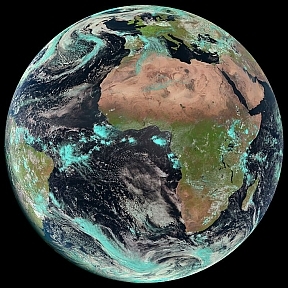Good practices
| ||
 Working Group:Science through digital learningCountry:PolandLanguages:PolishAge of students (target group/s):13-14, 15-18Links, resources:http://globe.gridw.pl/projekty/b... Working Group:Science through digital learningCountry:PolandLanguages:PolishAge of students (target group/s):13-14, 15-18Links, resources:http://globe.gridw.pl/projekty/b...Contact person information:UNEP/GRID-Warsaw Centre This email address is being protected from spambots. You need JavaScript enabled to view it. • Ready-to-use scenarios based on use of satellite data • Attractiveness of the activities – students are motivated to learn by use of new tools • Promotion of satellite data use – encouraging other educators to develop and enrich their own ways of teaching • Teachers taking part in workshops were able to acquire new skills (searching and analyzing remote sensing data)Limitations:• Teachers need to acquire new knowledge and skills to use remote sensing data in the classroom (for instance by taking part in trainings, workshops, e-learning courses) – not only technical but also experts knowledge (what can I see in the picture? How to interpret it?) • Most of information sources available in English (European/American Space Agencies) – some teachers may have problems using them.Added value with regards to the 3 topics of the MASS project:• Students use the Internet as a source of information (they learn how to search for information, verify and analyze it). • New sources of information presented in lessons (satellite images) – not typically used in everyday life • Teachers get to know methods of remote sensing analyzes (inspiration for future lessons) • Scientific approach introduced into analyzes of a problem defined (identification of a background, causes and results of specific climate phenomena)Any prerequisites needed:• Fast Internet connection • Adequate technical resources (computers, GPS devices, etc.) • Teachers need to be trained in how to use satellite data as well as other ICT in education. | ||
Teaching materials
MASS project intends to identify, analyze, evaluate and disseminate practical tools and methods in teaching science which will effectively lead to arise students' motivation and acquire higher level of basic skills in science. We will explore what happens in science lessons at schools and increase the knowledge of good practice in teaching science in three research areas: Science for Digital Learners, Early Inquiry and Low achievers in Science (See more: Main topics).
Main project activities include:
1. Identification of the national examples of good practices
The initial phase of the project is to analyze the strengths, weaknesses and potential in the particular area of science education method in each partner country. It will include identification of good practices on raising students motivation for science on the national level. Examples identified will be collected in the online database.
See more: Good practices repository
2. Development of pilot teaching materials and testing phase
Findings from the research phase of the project will form the ground for development of the pilot version of educational materials in each Working Group.
Piloting stage of the project, with the involvement of target group, will raise the quality and exploitability of the products.
3. Development of the final version of teaching materials
Final version of educational products will be developed after summing up the piloting phase. They will be available in each partner language. The final project results will bring a change at the classroom level. Teachers will be aware of the key factor for motivation of their students to learn science. They will use a wide range of methods effectively and appropriately to the learning needs and preferences of their students. More teachers will be confident and successful in use such of methods. They will make teaching science more relevant and accessible to students.
Final products will be widely presented and disseminated during the Open Conference III in the middle of 2016.
Pilot materials
To help teachers to become empowered, skillful and self-confident, we work on:
- Study (recommendations)
- Examples of good practices
- Module of teacher training
- Hands-on lessons / tutorials
for Digital Learners, Early Inquiry and Low Achievers in Science.
If you want to help us to improve these materials by taking part in piloting, please contact leader of each Working Group:
Leonie de Vries (Digital Learners), e-mail: This email address is being protected from spambots. You need JavaScript enabled to view it.
Lenka Pachmanova (Early Inquiry), e mail: This email address is being protected from spambots. You need JavaScript enabled to view it.
Daiga Kalnina (Low Achievers), e-mail: This email address is being protected from spambots. You need JavaScript enabled to view it.
or the MASS project partner in your country:
Czech Republic, TEREZA Educational Center
Lenka Pachmanova e-mail: This email address is being protected from spambots. You need JavaScript enabled to view it.
Cyprus, Cyprus Center for Environmental Research and Education (CY.C.E.R.E.)
Chrisis Kleovoulou, e-mail: This email address is being protected from spambots. You need JavaScript enabled to view it.
Estonia, Estonian Physical Society
Kaido Reivelt, e-mail: This email address is being protected from spambots. You need JavaScript enabled to view it.
Germany, University of Cologne Geographical Institute
Astrid Hensel, e-mail: This email address is being protected from spambots. You need JavaScript enabled to view it.
Greece, National and Kapodistrian University of Athens
Thalia Mavrakou, e-mail: This email address is being protected from spambots. You need JavaScript enabled to view it.
Latvia, Children's Environmental School
Inese Liepina, e-mail: This email address is being protected from spambots. You need JavaScript enabled to view it.
Netherlands, SME Advies
Bregje van den Brand, e-mail: This email address is being protected from spambots. You need JavaScript enabled to view it.
Poland, UNEP/GRID-Warsaw Centre
Elżbieta Wołoszyńska-Wiśniewska, e-mail: This email address is being protected from spambots. You need JavaScript enabled to view it.

